A total eclipse is near. For some, it's evidence of higher power. For others it's a warning
On April 8 in Gatesville, Texas, members of Coryell Community Church will congregate at the campus’ hilltop site where a trio of 70-foot crosses tower over the city of 17,000, 38 miles west of Waco.
The region lies in the center of the approaching solar eclipse’s path of totality, the last such event to affect the contiguous United States until 2044. Ancient cultures viewed the dusk-like darkness prompted by the passing of the moon between the Earth and sun, temporarily blocking the sun’s light, as a sign of the gods’ anger or even their impending departure.
Instead, Coryell’s “Eclipse of the Crosses” family gathering will feature live music, games and worship – an occasion to celebrate. Meanwhile, organizers at the Jewish Community Center of Greater Buffalo have bought a thousand eclipse glasses for a viewing event, complete with black-and-white half-moon cookies.
As the faithful convene in scattered Christian, Jewish and Muslim communities around the country, the gatherings reflect how celestial events once seen as ominous by some religious communities continue to wield spiritual significance today.
“An eclipse is yet another opportunity to witness the handiwork of God that exists in the universe,” said Eric Moffett, Coryell’s lead pastor. “We aren’t looking for any omens in the cosmos, but we are using this as an opportunity to, for a little over four minutes, be reminded that we live in world made by God and sustained by his love and goodness.”
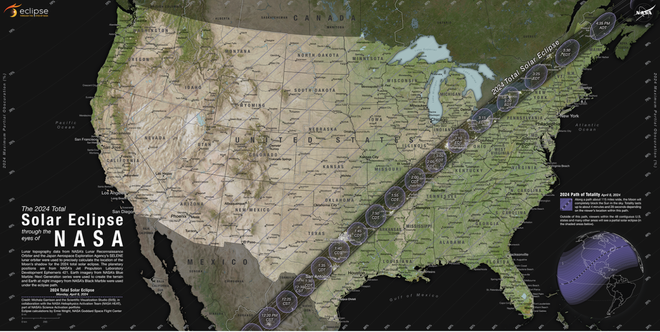
Eclipses have inspired fear and awe among civilizations throughout history, from the Aztecs to the ancient Hindus. They're also associated with some major religious events, including the darkness that accompanied Jesus’ crucifixion in Christianity and, in Islam, the passing of the Prophet Muhammad’s son, Ibrahim.
As the Bible's Gospel of Mark 15:33 reads: "And when the sixth hour had come, there was darkness over the whole land until the ninth hour."
Such references often emphasize the power of God over the cosmos, said James Willis, an assistant professor of practice for religion at the University of Indianapolis.
“What we today see as an astronomical event, people previously interpreted as having life-and-death significance," Willis said.
Earlier this month, in the Choctaw Nation newspaper Biskinik, a recurring column exploring Choctaw culture noted the sun was considered to bring life and good fortune; for some communities, when solar eclipses occurred, it was as if great black squirrels in the sky were devouring the sun. In response, all were called upon to make noise in an effort to frighten them away.

Bradley Schaefer, a professor astronomy at Louisiana State University in Baton Rouge, said in most pre-modern cultures, the sun god was among the most powerful deities in the pantheon. An eclipse represented the destruction of that god – or at least a dire sign.
“Where better to put signs from the gods but in the heavens?” Schaefer said. “If you see a sign in the heavens, it’s got to be from the gods. They’re telling us something, and what was universal from culture to culture is that it was always bad.”
In Islam, eclipses offer an occasion to pray
Fourteen centuries ago, as Islam’s Muhammad and his supporters grieved his deathly ill son, the prophet watched the toddler breathe his last as the skies darkened above them – the beginning, it is believed, of a total eclipse.
As the story goes, speculation spread among Muhammad’s followers that even the sun and moon were grieving his loss. In response, he summoned them to prayer and dispelled that notion, but added that such events, as signs of God’s power, should nonetheless inspire them to pray.
Omid Safi, a professor of Islamic studies at Duke University in Durham, North Carolina, said tradition holds that both solar and lunar eclipses are “divine matters unfolding in nature” while honoring the prophet’s “steadfast refusal to use the fortuitous occasion of a solar eclipse at the passing of his son as a way of bolstering his own standing.”
While Islam’s eclipse prayer is not a mandatory one, many still take time to recite it. During last fall’s annular eclipse, Muslim Americans around the U.S. gathered in places such as the Muslim Community Center–East Bay in Pleasanton, California; The Mecca Center in Willowbrook, Illinois; and at Commons Park in Fridley, Minnesota.
Nadia Abuisnaineh, who volunteers as a NASA solar system ambassador in the Minneapolis area, organized the Minnesota event hoping not only to pique her community’s scientific curiosity, but their sense of identity as Muslims.
Still, she had no idea the public gathering would come as Palestinians scrambled to evacuate northern Gaza in anticipation of a massive counteroffensive by Israeli forces, a week after the Oct. 7 attack by Hamas on Israel. The timing made the gathering all the more powerful, she said.
“My community was very hurt, and for them it was a time to reflect and ask God to alleviate the pain and suffering,” Abuisnaineh said. “I never imagined that five months later, with the second eclipse coming, that we would still have to think about this and be advocating for our brothers and sisters in Palestine.”
Those who witnessed the October eclipse were overcome by the event, she recalled, in particular, two older people moved to tears.
“Whether they were tears of grief because of what was happening in Gaza or just being overwhelmed by the eclipse and strengthening their relationship with God, it’s a privilege to allow people to do that,” she said.
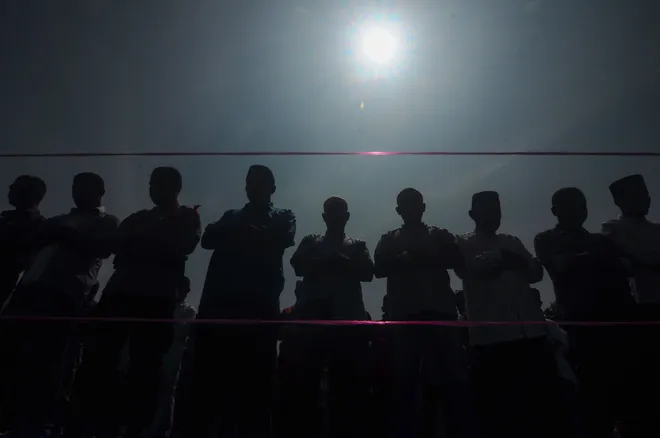
With the April 8 event coming during the most intense period of Ramadan, Abuisnaineh isn’t planning to arrange another prayer gathering. Instead, she plans to remind community members to use the time to reflect.
An avid stargazer who takes any opportunity to view the night sky, she’s not about to miss a solar eclipse.
“If it’s sunny, I’ll take out all my eclipse glasses and knock on every door in my neighborhood,” Abuisnaineh said. “It’s just a bummer to live your life and not know these things happen.”
'An ill omen for the world'
Perspectives on eclipses vary widely within the Jewish community, said Mark Horowitz, chief operating officer for the Jewish Community Center of Greater Buffalo. More conservative members, he said, still consider them warnings, especially for those in their path of totality.
“There are a lot of people who don’t believe it’s a time for putting on glasses, getting together and drinking or whatever people are going to do,” Horowitz said. “Some people believe it’s a time for prayer and introspection.”
The Hebrew word for eclipse, he noted, translates to “defect.”
“When the luminaries are stricken, it is an ill omen for the world,” reads the Talmud, a central text of Judaism. The passage offers the example of a king who, after preparing a feast for his servants, becomes angry with them and orders the removal of the lantern illuminating their banquet.
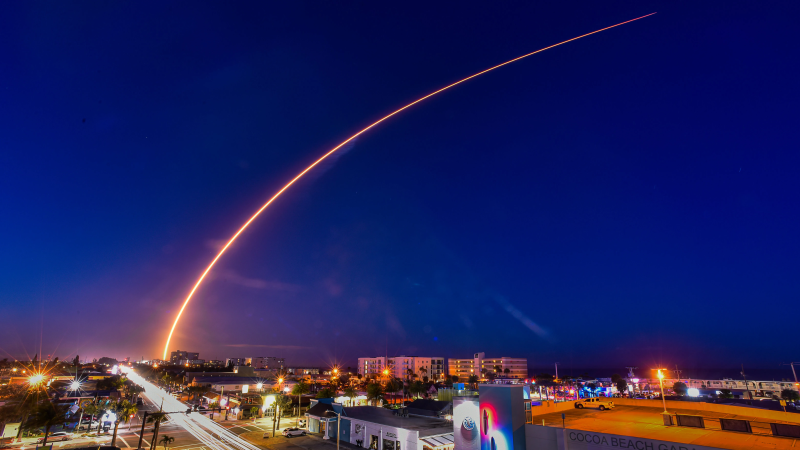
Even now, there are those who say celestial happenings warn of God’s imminent wrath; some have even claimed they bear political significance. In November 2022, some ultraconservative Christian pastors said the approaching blood moon lunar eclipse portended a surge of Republican midterm wins.
“God is warning America of impending disaster and destruction,” Anne Graham Lotz, daughter of iconic evangelist Billy Graham and founder of AnGel Ministries, wrote on her blog as the solar eclipse of August 2017 approached.
More recently, Lotz has seen speculation among some that the combined paths over the U.S. of this year’s eclipse and the previous two solar eclipses appear to mimic the shapes of the first and last letters of the Hebrew alphabet – in other words, the beginning and the end.
“Maybe people are reading too much into it,” she said. “But when you look at the world, you don’t need an eclipse to know that things are getting really dangerous. Maybe it’s telling us it’s time to get right with God and the people in our lives, so that we have no regrets.”
Eclipses offer a spiritual experience, even for nonbelievers
Scahefer, of Louisiana State University, said as the science behind eclipses began to be understood, some used such knowledge to their advantage, among them Christopher Columbus, who in 1504 was shipwrecked with his crew in Jamaica and for months relied on local natives to provide food in exchange for trinkets.
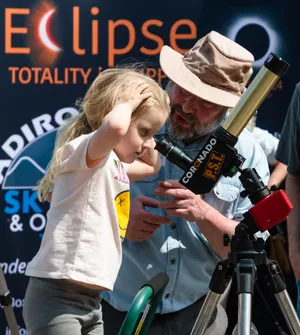
As those gifts started to wear thin, the natives refused to continue, Schaefer said. Columbus seized on the idea of using an approaching lunar eclipse to convince the locals he could commune with the gods and make the moon disappear.
“That’s the beauty of science, is when you make predictions they come true,” Schaefer said. “Columbus knew it was just a shadow. But the Jamaicans saw it as a death of a god. Once you understand what an eclipse is, it’s no longer the realm of the gods.”
Still, he said, even the way Americans view eclipses has changed over time. Accounts of New Yorkers witnessing a total eclipse in 1924 described silent crowds of people solemnly taking it in.
“Now it’s just raucous fun,” Schaefer said. “No one is fearful that Jupiter will come down and steal their soul.”
Witnessing a solar eclipse, however, can provide a spiritual experience, even for those who aren’t necessarily religious, he and others said.
Former NASA engineers Jeff Stone and his wife, Susan, will be experiencing the eclipse from their hilltop home in Kerrville, Texas.
“Her priority was to have a nice view,” Stone said. “My priority was to be as close to the centerline of the eclipse as possible. We managed to do both.”
When they worked as flight controllers for the Space Shuttle program at Houston’s Johnson Space Center, the couple traveled to Mexico in 1991 to experience nearly seven minutes of totality when a solar eclipse passed over the region. They’ve been eclipse-chasers ever since.
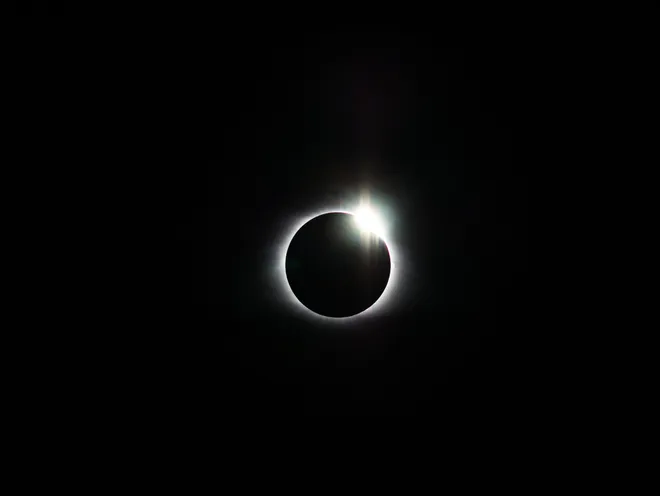
April 8, the Stones will host a dozen-plus visitors from as far away as Sweden to experience this year’s event.
“It’s such an emotional event,” Stone said. “It touches your soul, it really does. Any time you realize there’s something bigger than you, it gives you perspective. Surely that power has a purpose.”
In Buffalo, Horowitz said the eclipse, while an obvious reminder of nature’s beauty, offers a chance to reflect on nature’s fragility and to find hope amid worldly chaos and personal challenges.
“You can sometimes be clouded by all that darkness,” he said. “The natural world is trying to tell us that beyond the darkness, there is light.”
Disclaimer: The copyright of this article belongs to the original author. Reposting this article is solely for the purpose of information dissemination and does not constitute any investment advice. If there is any infringement, please contact us immediately. We will make corrections or deletions as necessary. Thank you.



